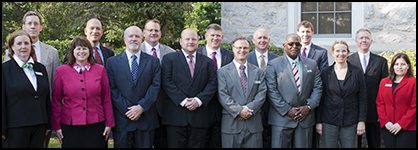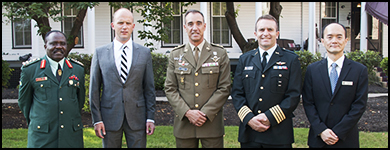
The Department of Distance Education seeks to educate and develop leaders for service at the strategic level while advancing knowledge in the global application of landpower.
The Distance Education Program (DEP) at the US Army War College allows you to participate in a two-year, high-quality program of instruction that results in the award of the same Military Education Level and the same fully-accredited Master of Strategic Studies degree awarded to graduates of the USAWC resident program. The DEP is accredited by the Chairman, Joint Chiefs of Staff, as a program for joint education, Phase I Senior Level (JPME I) and for selected students in Phase II Senior Level (JPME II). The Distance Education Program allows you to work a regular full-time job and still make time for a War College degree. You will need to devote 15 hours each week to a program that is delivered to you via the Internet, one that leverages technology to enhance the educational experience. Under the "Curriculum" link to the left, you will find an overview of the program and courses offered.



The DEP is designed to be provocative, demanding, and rigorous. You will be in a class of highly intelligent professionals who seek to hone their intellectual skills and professional competency. You will be challenged academically, but there are teams of trained professionals to assist you as you wrestle with many of the complex issues of today's global situation.
Your view of many issues may change as you work through the program. Here, there are at least two sides to every issue and often, there are no school solutions. Is this program for you? Do you want to know more? Click on the buttons above to learn more about this unique academic program!
The department also offers a four-month, online Defense Strategy Course (DSC), and a twelve-week, online Defense Strategy Foundation Course (DSFC). DSC is designed for majors and lieutenant colonels desiring to learn how the nation develops national security policy and strategy. DSFC is designed for GS 14 and 15 level civilians from the Defense Senior Leader Development Program (DSLDP) focusing on the National Security Strategy policymaking process and the relationship of the national instruments of power to defense strategy. Please view the "Curriculum" link on the left and expand the "Defense Strategy Course" or "Defense Strategy Foundation Course" links at the bottom of the page to view more about these course offerings.
Please view important dates below.
DEP Block Calendar
The Army War College does not accept individual applications into its SSC programs except through special exceptions. A DA-centralized board is held on behalf of the CAR to identify officers to attend SSC. USAR officers are selected according to AR 350-1. Commissioned officers from all components should remember that according to the provisions of AR 350-100, attendance at the Army War College incurs a 2-year service obligation. U.S. Army War College Distance Education Course allows you to participate in a 2-year, rigorous program of instruction that results in the award of the same graduation certificate and the same fully accredited master of science degree awarded to graduates of the resident program. You will need to devote 15 hours each week to a program that is delivered to you via the Internet, one that leverages technology to enhance the educational experience. Only the resident SSC courses and nonresident Army War College course award MEL SSC and JPME II upon completion. SSC graduates are assigned to organizations based on guidance from the CAR, and Director of ARNG. Tours following graduation are to the Army Staff, the Joint Chiefs of Staff, Secretary of Defense, ACOM, and combatant command staffs in branch, FA, branch/FA generalist or joint positions."

U.S. Military. To attend the United States Army War College a prospective student must be a serving colonel or lieutenant colonel with at least 16 but not more than 25 years of service at the starting date of the course. Students must have completed the Command and General Staff College, or the equivalent. To be eligible potential students must have completed a baccalaureate degree or equivalent from a regionally accredited institution. The years of service prerequisite may be waived for deserving officers by their component. Requests for waiver shall be endorsed by the applicant's immediate commander and will accompany the officer's application.

Civilian. To attend the Army War College, Department of the Army Federal Government civilians must be at the grade of GS/GM-14. Other DoD and Federal Government civilians may be accepted in the grade of GS-13.

International Fellows. All students attending the USAWC are expected to read, write, and speak English fluently. Native speakers of English are defined as those individuals who have received all of their primary and secondary education in the following countries: Antigua, Australia, Bahamas, Barbados, Belize, Brunei, English-speaking Canada, Dominica, Grenada, Guyana, India, Ireland, Jamaica, Malta, Mauritius, New Zealand, Singapore, St. Kitts, St. Lucia, St. Vincent, Trinidad, and the United Kingdom. Non-native speakers of English must demonstrate proficiency by taking the Test of English as a Foreign Language (TOEFL) which must be taken prior to enrollment at USAWC. A score of 557 on the paper-based test, 83 Internet based, or 220 on the computer-based test is the minimum for enrollment in the program of instruction at the U.S. Army War College. Information on the TOEFL may be obtained by writing to:
International Fellows seeking enrollment in the Master of Strategic Studies degree program must submit their transcripts and supporting documentation to the USAWC Registrar's Office for assessment by an outside review body to determine equivalency of their degree.
Service Obligation. Commissioned officers from all components should remember that according to the provisions of AR 350-100, attendance at the Army War College incurs a two-year service obligation. Prospective students from other services or government organizations are encouraged to determine if an obligation is incurred and the extent of the obligation.